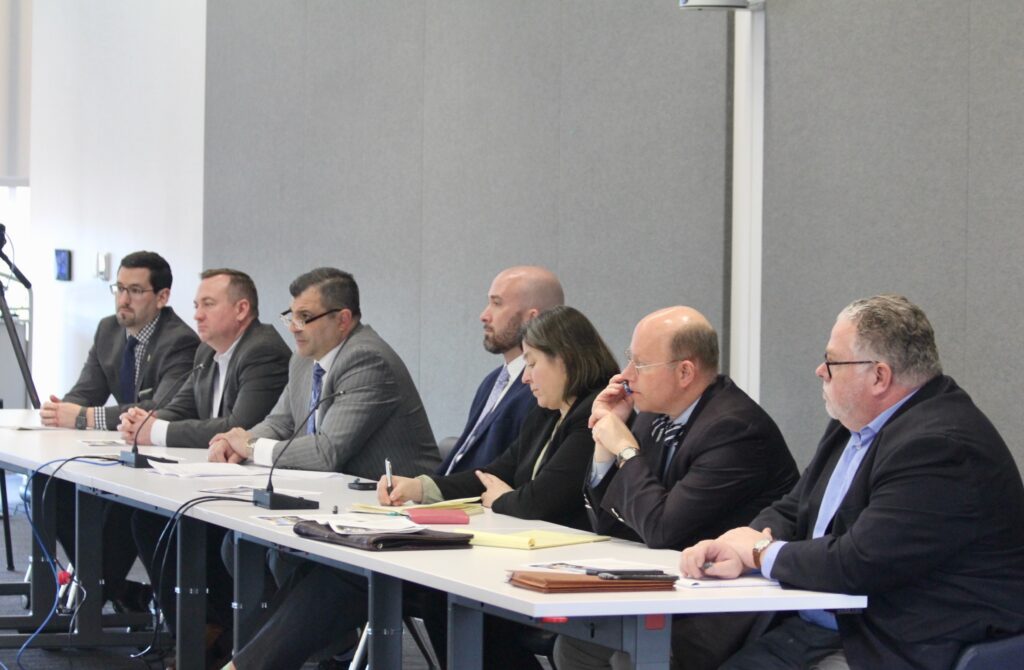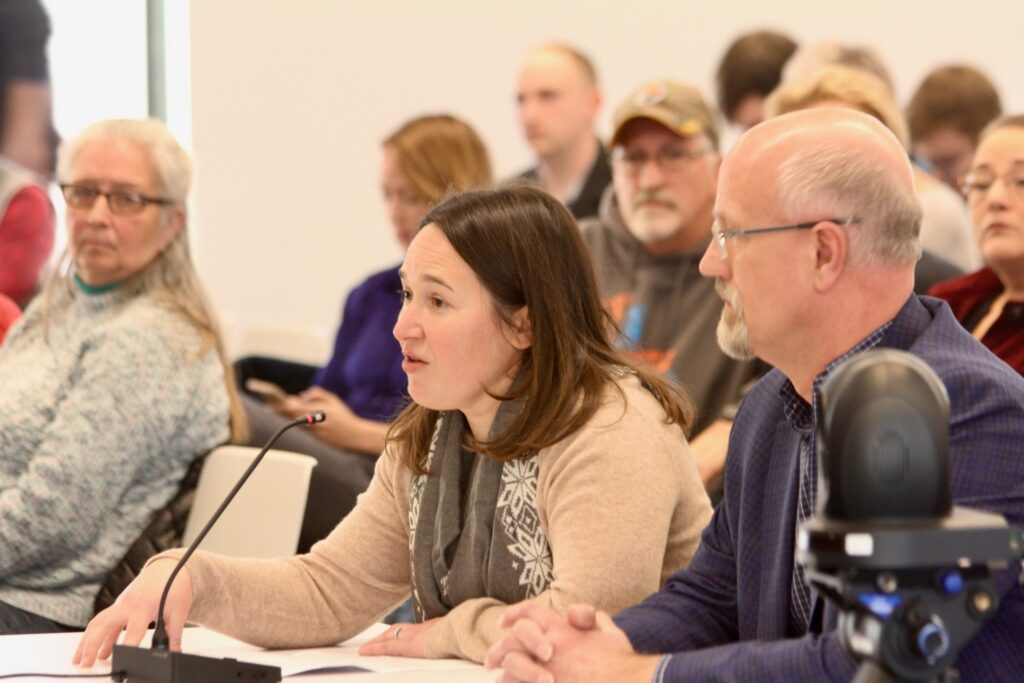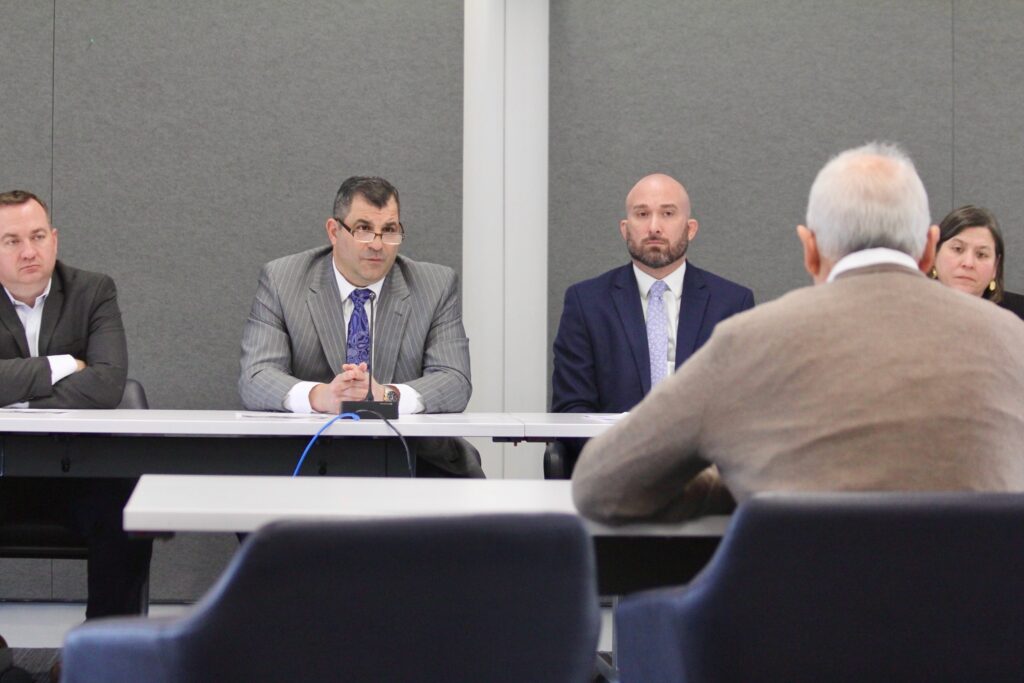Pennsylvania House Speaker Mark Rozzi visited State College on Wednesday to continue his ongoing “listening tour” across the commonwealth.
Rozzi, a Democrat from Berks County, is using the tour to hear feedback from constituents while the deadlocked Pennsylvania House remains adjourned until late February. Speaking before about 80 guests at Penn State’s Eric J. Barron Innovation Hub on South Burrowes Street, he said the public forum hopes to cut out the middle man and hear directly from voters themselves.
“The purpose of this tour is to hear from you, the people,” Rozzi said. “A decade of ever-increasing hyperpartisanship has left Harrisburg in a gridlock, and that is where you come in. We cannot continue to do the same thing — and I’ve been saying this at every stop along the way — and expect results. We need fresh ideas.”
Although guests speaking during an hour devoted to public comments mostly strayed from the topic at hand, Rozzi’s tour generally sought feedback on House rules and governing procedures that remain undetermined for the 2023-24 session. Rozzi formed a bipartisan working group, which is also attending the listening tour, to “find a way forward” and chart out the House’s new operating rules.

Perhaps the most significant topic discussed at Wednesday’s session was a constitutional amendment that, if passed, would create a two-year window for Pennsylvania victims of child sexual abuse to sue over abuse cases. The proposed revision would build on a 2019 law that previously extended the statute of limitations for child sex abuse victims to sue abusers and eliminated any statute of limitations for criminal prosecution of future cases. The amendment remains a high priority for Rozzi, who says he was abused by a priest as a teenager.
Several speakers at Wednesday’s event voiced support for the amendment, which has now failed to appear on May’s primary ballot. Once state legislators reconvene in February, the amendment could still be passed and later placed on any ballot until 2024.
Donna Greco, the public policy director of the Pennsylvania Coalition Against Rape, spoke in favor of the amendment on Wednesday.
“This window is also of great significance to all of us in this room and in Pennsylvania because when survivors are heard and are able to access justice, it benefits all of us because justice for victims means stronger and safer communities for all of us and for our children,” Greco said. “Without the window, people and institutions that played a role in sexual abuse against children go unpunished, unidentified. Without the window, victims are punished instead for being too late in coming forward.”
The future of such a constitutional amendment appears murky for now despite general support for its passing. Earlier this year, the state Senate passed the measure in a 28-20 vote that bundled it together in one package with other amendments that would create a mandate for universal voter IDs and give the General Assembly more power to override regulations. Together, they failed to clear the state House by the end-of-January deadline to appear on May’s ballot.
Wednesday’s listening tour stop covered much more than proposed constitutional amendments, however. For nearly two hours, constituents from State College and beyond took to the microphone to voice their support for new regulations, increased education funding and more frequent cooperation between politicians in Harrisburg.
Jesse Barlow, president of the State College Borough Council, began Wednesday’s session by encouraging lawmakers to revise Pennsylvania’s local preemption laws that can nullify a municipality’s self-governing authority. He said the borough’s inability to regulate policies and make its own choices, including raising the minimum wage and implementing a hypothetical alcohol tax, is frustrating.
“There are other things that I can list that we’re not allowed to regulate because of state preemptions — because, essentially, legislators substituted themselves for our voters and don’t allow us to do things,” Barlow said. “This is one of the most expensive places in Pennsylvania to live — more expensive than Harrisburg or Pittsburgh and probably more expensive than some areas in Philadelphia — and yet, we’re not allowed to raise the minimum wage. The minimum wage in this state is the federal minimum wage, which is not anywhere close to a living wage, and this needs to be changed. If you don’t want to do it, we want to be able to do it. There are a lot of things like that that have been frustrating to me as a local official.”
Centre County Commissioners Mark Higgins and Amber Concepcion also spoke to the panel. The former, who has served as commissioner since 2015, encouraged lawmakers to help Centre County in its efforts to improve broadband internet access to rural communities.
“There’s people in this audience who did not have high-speed internet four years ago. Now they have three different vendors to pick from,” Higgins said. “We need that rolled out statewide, and the state legislature is a critical partner in that area.”
Higgins also implored the panel to restore previously reduced funding for human services initiatives in Pennsylvania, in addition to providing increased support for county commissioners who organize elections across the commonwealth.

Concepcion, who was appointed to the board in January following an 11-year tenure on the State College Area School Board, voiced support for increased funding that would provide mental health resources for inmates at county correctional facilities.
“The county corrections facilities, we know, have a significant number of inmates with significant mental health issues,” she said. “We need funding to provide for community-based resources and means to ensure that our corrections facilities are not essentially the first landing place for the folks who have significant mental health issues that really need to be in treatment, rather than in our corrections facilities.”
The comments during Wednesday’s session were not limited to public officials who already have notable platforms. Many Centre County residents spoke about issues facing them, including harrowing accounts of gun violence and its impacts on local communities.
Margie Swoboda, a retired teacher and Huston Township resident, recounted visiting her nephew in the hospital for six weeks after he was shot while attending his first day of medical school in 2010.
“[Gun violence has] gone on too long,” Swoboda said. “The people in this room that have been saying things about Second Amendment rights… You know what? Stop it. It’s not appropriate anymore. The guns have gotten out of control, and Pennsylvania should take a leadership role in that.”
Rozzi’s listening tour wraps up on Thursday with a stop in Wilkes-Barre. More information, including forms to submit written comments, is available online.




